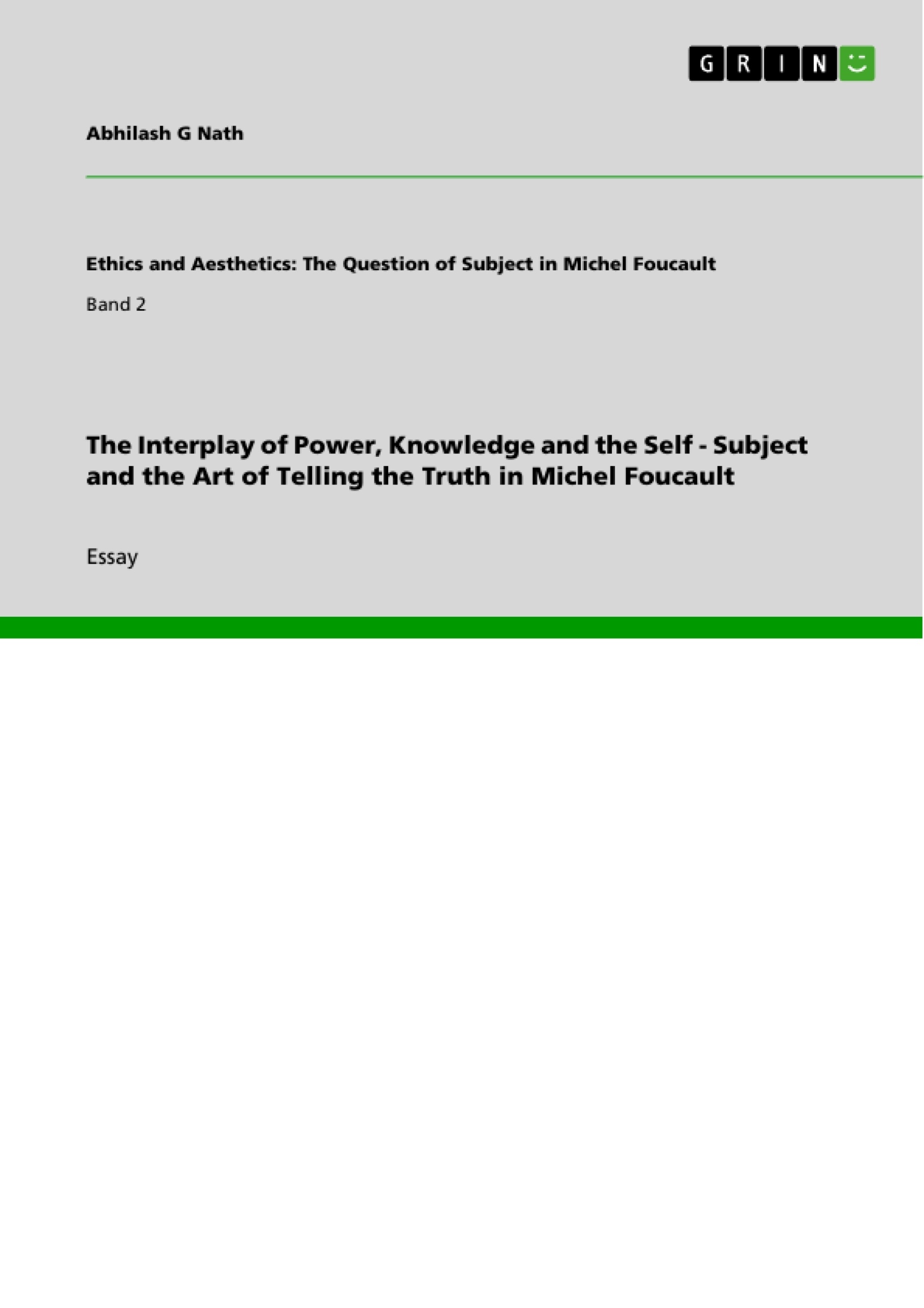It is quite interesting to notice that as Foucault re-imagined his entire intellectual endeavour, he rightly elevated one aspect of his interest to the heart of the entire problematic whether it be his study of knowledge or power or even human behaviour – and that is the problem of subject. Though an idea of a ‘passive subject’ is implicit in his early studies, as they deal with the discursive formations and power, it is only in Foucault’s later writings that ‘subject’ emerges as the major concern. Subject here becomes central to one function that is the function of “telling the truth,’ especially, in a historical formation in which ‘truth’ is something that is granted and is produced in an environment of inter-related discursive and non-discursive systems.
Inhaltsverzeichnis (Table of Contents)
- I
- II
- III
Zielsetzung und Themenschwerpunkte (Objectives and Key Themes)
This PhD synopsis delves into the intricate interplay of power, knowledge, and the self in the works of Michel Foucault. It seeks to examine how Foucault conceptualizes the "knowing-subject" and explores the complexities of truth, power, and ethics in shaping individual experience and self-formation.
- The "knowing-subject" as a product of historical and cultural forces
- The role of language and the "thought from outside" in challenging traditional philosophical concepts
- The process of "problematization" and the constitution of individual interiority
- The relationship between "aesthetic of existence" and the formation of the self
- The ethical implications of Foucault's analysis of truth, power, and the self
Zusammenfassung der Kapitel (Chapter Summaries)
I: This chapter introduces the central theme of the synopsis, the "knowing-subject" in Foucault's work. It highlights Foucault's shift from earlier studies on institutions and disciplines to a focus on the subject's relationship to truth, power, and ethics. The chapter explores the concept of "telling the truth" as an ongoing process of self-reflection and engagement with knowledge.
II: This chapter examines Foucault's concept of "the thought from outside" and its connection to language. It explores how language can offer an experience of exteriority, challenging the dominance of interiority and subjective experience within a given culture. The chapter further analyzes the importance of literature as a site where such an experience of language can unfold.
III: This chapter delves into the concept of "problematization" and its relationship to the constitution of the self. It analyzes how Foucault examines the formation of individual interiority through specific examples from ancient texts and their ethical implications. The chapter highlights the importance of self-care and self-knowledge in shaping individual identity.
Schlüsselwörter (Keywords)
Michel Foucault, subject, knowledge, power, truth, ethics, language, thought, exteriority, interiority, problematization, aesthetic of existence, self-care, self-knowledge, historical ontology, genealogy, discourse, subjectivity.
Frequently Asked Questions
What is the central theme of Foucault's later intellectual work?
The central theme is the problem of the "subject." While his earlier studies focused on discursive formations and power, his later writings elevate the subject to the heart of his problematic, specifically in relation to truth and ethics.
How does Foucault conceptualize the "knowing-subject"?
He views the "knowing-subject" as a product of historical and cultural forces rather than a fixed biological or psychological entity. This concept explores how individuals are shaped by the interplay of truth and power.
What is the significance of "telling the truth" in this context?
In Foucault's analysis, telling the truth is a function produced within inter-related systems. It involves an ongoing process of self-reflection and engagement with knowledge, often tied to the "aesthetic of existence."
What does Foucault mean by the "thought from outside"?
The "thought from outside" is a concept connected to language that offers an experience of exteriority. It challenges the dominance of traditional interiority and subjective experience within a culture.
How does the process of "problematization" relate to the self?
Problematization is the process through which Foucault examines the constitution of individual interiority. It analyzes how ethical implications and self-care shape identity based on historical texts.
What are the ethical implications of Foucault's work on the self?
The work highlights the importance of "self-care" and "self-knowledge" as ethical practices. It explores how individuals can form themselves through an "aesthetic of existence" in response to truth and power structures.
- Quote paper
- Abhilash G Nath (Author), 2011, The Interplay of Power, Knowledge and the Self - Subject and the Art of Telling the Truth in Michel Foucault, Munich, GRIN Verlag, https://www.hausarbeiten.de/document/166668


